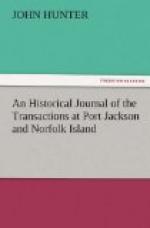Of the convicts who were received by the last ships, there were great numbers of the worst of characters, particularly amongst those who came from Ireland, and whose great ignorance led them into schemes more destructive to themselves than they were likely to be to the settlement. Some of these people had formed an idea that they could go along the coast, and subsist on oysters and other shell-fish, till they reached some of the Chinese settlements: others had heard that there were a copper coloured people only one hundred and fifty miles to the northward, where they would be free. Full of these notions, three parties set off; but, after straggling about for many days, several of them were taken, and others returned to the settlement. Governor Phillip was less inclined to inflict any punishment on these people, than to punish those who had deceived them by the information of “not being far from some of the Chinese settlements, and near people who would receive them, and where they would have every thing they wanted, and live very happy:”
These reasons most of them assigned for going into the woods, and where some of them still remained, dreading a severe punishment if they returned: a general pardon was therefore promised to all those who came back within a certain time, as several were supposed to be lurking in the woods near the settlement; however, some of these wretches were so prepossessed with the idea of being able to live in the woods and on the sea-coast until they could reach a settlement, or find a people who would maintain them without labour, that several who were brought in when almost famished, and carried to the hospital, went away again as soon as they were judged able to return to their labour; and although what would be called a day’s work in England is very seldom done by any convict in the settlement, yet some of them declared that they would sooner perish in the woods than be obliged to work; and forty were now absent.
In order to give those who might be still lurking near the settlement an opportunity of returning, all the convicts were assembled, and a pardon was promised to all who returned within five days; at the same time they were assured that very severe punishment would be inflicted on any who were taken after the expiration of that time, or who should in future attempt to leave the settlement.
Several appeared sensible of the lenity shown them when their irons were taken off, but some of them appeared capable of the most desperate attempts, and even talked of seizing on the soldiers arms; they were, however, informed, that no mercy would be shown to any who were even seen near those that might make an attempt of the kind.
All the whalers who came into the harbour to refit, sailed again by the 1st of December, and the Albemarle and the Active transports sailed on the 2d for Bombay, where they were to load with cotton for England.
A new store was now covered in at Sydney, which was the best that had been built in the colony; and was intended for the convicts cloathing and the implements of husbandry: it has a second floor, and is eighty feet in length by twenty-four feet in breadth. A building of fifty-six feet by twenty-four was likewise covered in at Parramatta, and was intended for a place of worship, until a church could be built.




